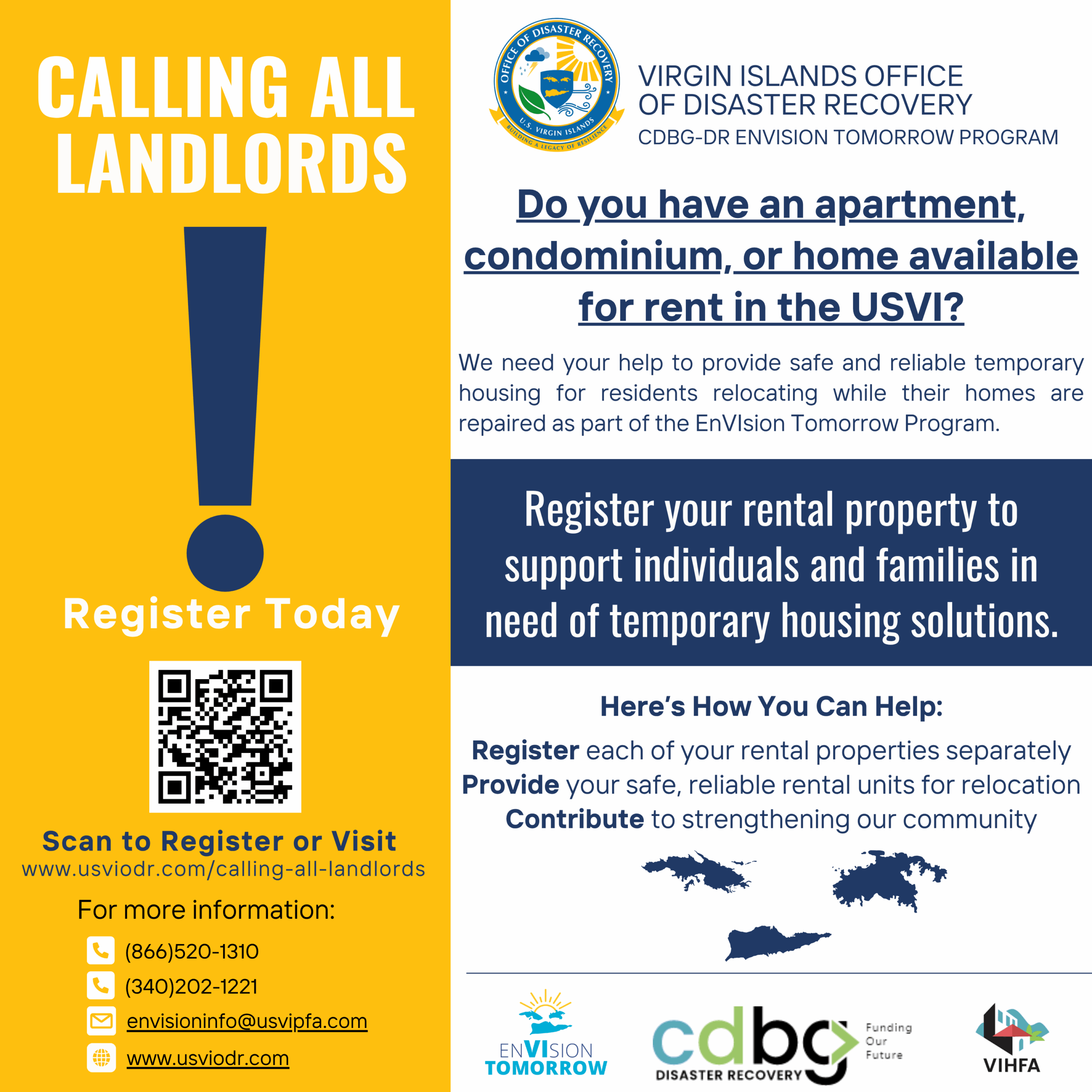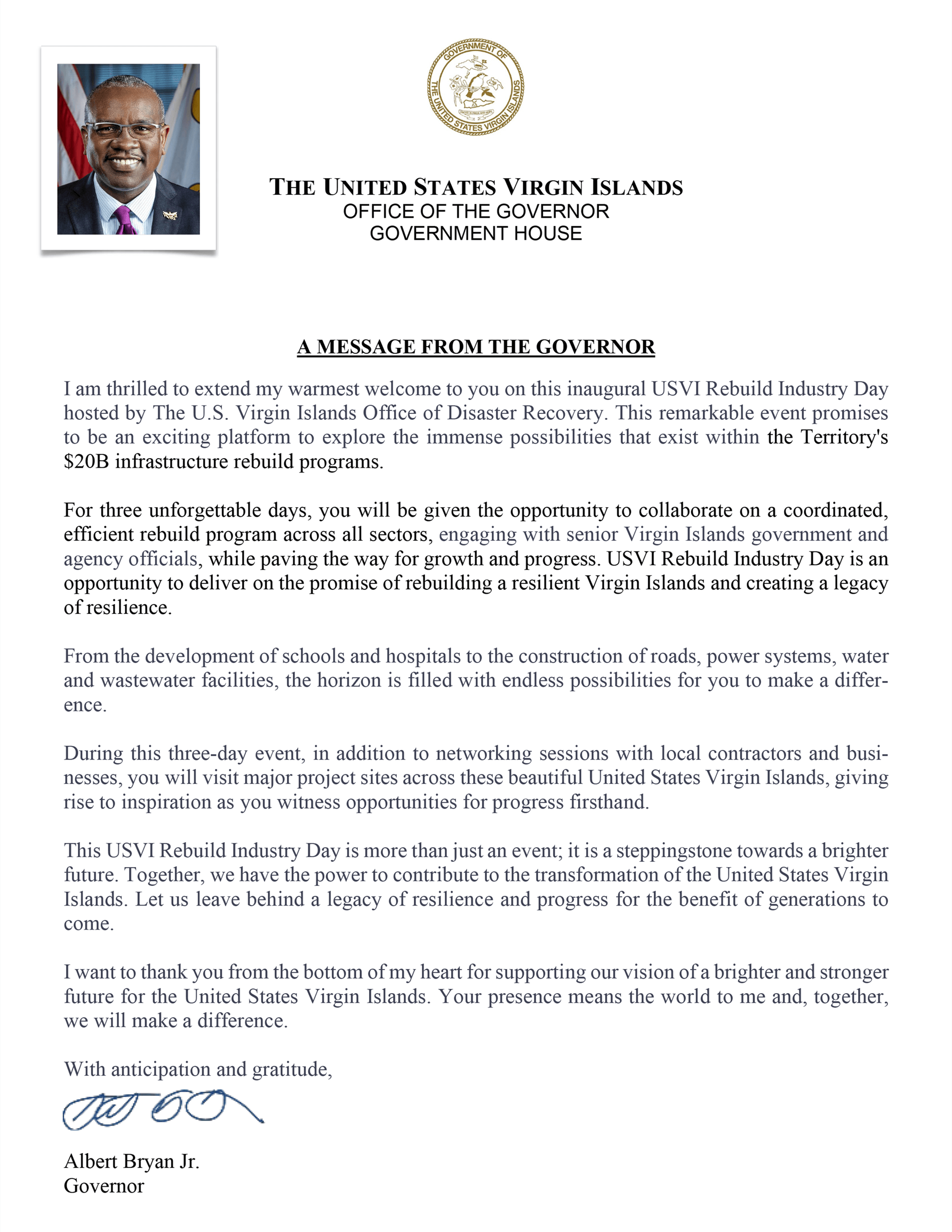-
How do I register my rental property with the EnVIsion Tomorrow Program?

If you have a rental property available and are interested in registering it to fill this critical need, please use this form to register each location separately and email it to [email protected].
The form is also available online. Click HERE for the web version.
Thank you for supporting disaster recovery efforts and helping to build a stronger, more resilient community. If you have any questions or concerns, please contact us at (340)202-1221 or email [email protected].
-
How do I update my EnVIsion Tomorrow Application?
Click HERE to access the letter and form.
-
How do I find out the status of my EnVIsion Tomorrow application?
You can call 1-866-520-1310 or send an email to [email protected].
-
Who will be responsible for establishing project environmental and other permits?
Contractors are required to obtain all specified permits from the Department of Natural Resources and Department of Public Works as required.
-
What licenses will contractors need to bid?
- Contractors will need to have the required construction and/or engineering licenses to be eligible for the contract.
- Licenses are issued by the USVI Department of Licensing and Contracts (DLCA). Click HERE for more information.
- Businesses must first register a business entity and trade name with the Office of the Lieutenant Governor, Division of Corporations and Trademarks, at this LINK.
-
Are there any programs to help contractors with Bonding requirements?
No.
-
What are the bonding requirements for Rebuild USVI Projects?
Rebuild USVI projects will use standard USVI bonding requirements for federally funded projects:
- Performance bond – 100% of the contract value
- Payment bond – 100% of the contract value
-
Will there be DBE reciprocity with any states?
Yes.
-
What Disadvantaged Business Enterprise (DBE) programs and requirements will be in place for Rebuild contracts?
There will be DBE participation goals for the bundles, and local supplier and contractor involvement will be strongly encouraged.
-
Who will contractors engage with in the government?
Contractors will be working through the Office of Disaster Recovery (ODR). The Rebuild USVI’s Super PMO office is being developed and will be part of ODR, which will serve as a single point of contact for contractors to correspond with to ensure needed decisions or support are enacted.
-
Who is the payment counterparty?
Payments will be processed by the US Virgin Islands Public Finance Authority (PFA).
-
How long will it take for contractors to receive payments?
Contractors will receive payment 30-45 days after invoices/payment packages are deemed complete.
-
How are Rebuild USVI projects being funded?
Rebuild USVI projects are funded by the Federal Emergency Management Agency (FEMA) as well as other federal funding sources. The USVI has secured funding, and the required local match has been reduced. The Territory has sufficient CDBG-DR funds to cover the remaining share.
-
For Bundles with projects that have previous designs, will the bridging architect need to be part of the bidding team?
No.
-
Will the RFQ cover future project bundle releases?
The current RFQ will provide qualification for project bundles 1 through 3.
-
Will there be opportunities to offer comments on the draft RFQ and draft RFP?
Yes, they will include a comment period.
-
Will proposals with alternative contracting and pricing models be accepted?
Yes, but they will be judged on their overall value to the USVI, similarly to other contracting and pricing models. During solicitation, they will be rated against the criteria requested in the proposal. Other alternative models may be considered on a case-by-case basis.
-
What pricing will be used for Rebuild USVI bundles?
Bundles will typically use a guaranteed maximum price contracting model to ensure a fair sharing of risk between the contractor and the USVI government. There will be an equitable sharing of risk in all bundles, and contractors will be expected to negotiate as partners.
-
What contracting models will be used in Rebuild USVI bundles?
Bundles with a contracted A&E firm and/or have a complete or nearly completed design will be under a construction manager at-risk (CMAR) model, in which the construction manager will have input to finalize the design and negotiate a guaranteed maximum price.
The remaining bundles under 30% design will pursue a progressive design-build model, in which the contractor will be responsible for the majority of the design. During design completion, the contractor and USVI will negotiate a final guaranteed maximum price or other payment model to complete construction.
-
What opportunities are there to visit project sites, and when?
Information on site visits will be provided as a part of the solicitation process.
-
How can we submit questions to ODR and/or Rebuild USVI?
Questions can be submitted by clicking HERE or sending an email to [email protected]. Most inquiries will receive a response within five business days.
-
What are the first bundles and the expected timelines for the release of those RFPs?
Rebuild USVI: RFP Bundle 1 – St. Croix Health Facilities
Date Draft RFP (Issued to Potential Respondents) March 2024 (with RFQ) RFP Issued June 2024 Submission Deadline August 2024 RFP Interviews (TBD) September 2024 RFP Decision October 2024 Rebuild USVI: RFP Bundle 2 – St. Thomas schools
Time Draft RFP Issued to Potential Respondents April 2024 RFP Issued June 2024 RFP Submission Deadline August 2024 RFP Interviews (TBD) September 2024 RFP Decision October 2024 -
What is the expected RFQ timeline?
RFQ Issued March 2024 RFQ Submission Deadline April 2024 Shortlist Selection June 2024 - What is Federal Consistency?
-
What are “Emergency” Repairs?
FEMA Category B projects are referred to as Emergency Protective Measures.
These projects execute temporary emergency repair or stabilization of an eligible facility in order to eliminate or lessen an immediate threat.
-
What is an UEI number?
By April of 2022, the federal government will stop using the DUNS number to uniquely identify entities. At that point, entities doing business with the federal government will use a Unique Entity Identifier (SAM) created in SAM.gov. They will no longer have to go to a third-party website to obtain their identifier. This transition allows the government to streamline the entity identification and validation process, making it easier and less burdensome for entities to do business with the federal government.
Read more HERE
-
What does expended mean?
Expended is the amount of available funds actually spent to accomplish the deliverables of a project.
-
What does obligated mean?
An obligation is a binding agreement tied to award funding by the US government, which would result in outlay (money available to spend) in the immediate or near future. Obligations may cover the full immediate project cost or maybe phased in based on additional requirements needed for future project review.
-
What does allocated mean?
Allocated is the assignment of appropriated funds to specific states, territories, tribes or local units of government. It is the amount of funding set aside for specific projects/goals in advance of federal obligations.
-
Who can I Contact to Report Fraud, Abuse and Waste?
The Office of Inspector General (OIG) Hotline is a resource for Federal employees and the public to report allegations of employee corruption, civil rights and civil liberties abuses, program fraud and financial crimes, and miscellaneous criminal and non-criminal activity associated with waste, abuse or fraud affecting the programs and operations of the U.S. Department of Homeland Security (DHS).
-
Why was the ODR Created?
The ODR was created to serve as the center of coordination for the anticipated $8 billion of federal funding over the next few years to support recovery efforts from the 2017 Hurricanes Irma and Maria.
-
Who can Apply for Community Development Block Grants?
Registered non-profits or faith-based organizations in good standing and government entities can apply. The applicants must have a valid Tax Identification Number (TIN) and a Dun & Bradstreet registration number (DUNS#). Instructions for requesting a DUNS# is included with the CDBG application.
-
What Types of Projects and Activities can be Funded by Community Development Block Grants (CDBG)?
In order to be eligible for funding, a project must include one or more of the activities listed below:
- Acquisition of real property in conjunction with an eligible use such as the development of a community facility;
- Construction, reconstruction, rehabilitation, or installation of public facilities and improvements;
- Clearance, demolition, and removal of buildings and improvements;
- Provision of public services (including labor, supplies and materials) directed toward improving the community\’s living environment, including but not limited to those public services and facilities concerned with employment, crime prevention, child care, health, drug abuse treatment or prevention, education, fair housing counseling, energy conservation or recreation needs;
- Repair of streets, sidewalks, parks, playgrounds, publicly-owned utilities, and public facilities, special garbage, trash and debris removal in areas exhibiting signs of physical deterioration or in order to eliminate emergency conditions;
- Removal of architectural barriers;
- Acquisition, construction, reconstruction, rehabilitation or installation of the distribution lines and facilities of privately owned utilities;
- Rehabilitation of privately owned buildings for residential purposes, improvements to the exterior of commercial or industrial buildings or the rehabilitation, preservation or restoration of historic properties;
- Acquisition, construction, reconstruction, rehabilitation or installation of commercial or industrial buildings, structures or the provision of assistance for for-profit businesses;
- Planning, survey, or development of architectural plans in conjunction with an eligible project such as construction, reconstruction, rehabilitation, or installation of public facilities and improvements or repair of streets, sidewalks, parks, playgrounds, publicly-owned utilities

